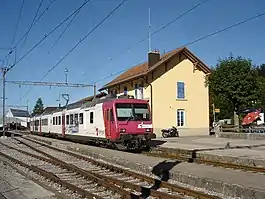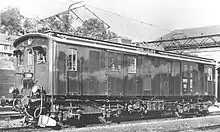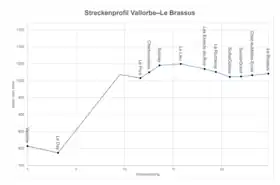Pont–Brassus Railway
The Pont–Brassus Railway ( Chemin de fer Pont–Brassus; PBr) was a railway company in the Swiss canton of Vaud. It built a standard gauge line from Le Pont parallel to the north shore of the Lac de Joux to Le Brassus. The line has been owned by the Travys regional transport company since 2001. Passenger traffic on the line is operated by Swiss Federal Railways (SBB). Trains run continuously from Vallorbe via Le Pont to Le Brassus. They operate hourly on non school days and half-hourly on school days.
| (Vallorbe–) le Pont–le Brassus | |||||||||||||||||||||||||||||||||||||||||||||||||||||||||||||||||||||||||||||||||||||||||||||||||||||||||||||||||||||||||||||||||||||||||||||||||||||||||||||||||||||||||||||||||||||||||||||
|---|---|---|---|---|---|---|---|---|---|---|---|---|---|---|---|---|---|---|---|---|---|---|---|---|---|---|---|---|---|---|---|---|---|---|---|---|---|---|---|---|---|---|---|---|---|---|---|---|---|---|---|---|---|---|---|---|---|---|---|---|---|---|---|---|---|---|---|---|---|---|---|---|---|---|---|---|---|---|---|---|---|---|---|---|---|---|---|---|---|---|---|---|---|---|---|---|---|---|---|---|---|---|---|---|---|---|---|---|---|---|---|---|---|---|---|---|---|---|---|---|---|---|---|---|---|---|---|---|---|---|---|---|---|---|---|---|---|---|---|---|---|---|---|---|---|---|---|---|---|---|---|---|---|---|---|---|---|---|---|---|---|---|---|---|---|---|---|---|---|---|---|---|---|---|---|---|---|---|---|---|---|---|---|---|---|---|---|---|---|
 Travys RBDe 4/4 568 384 push-pull train in Sentier-Orient | |||||||||||||||||||||||||||||||||||||||||||||||||||||||||||||||||||||||||||||||||||||||||||||||||||||||||||||||||||||||||||||||||||||||||||||||||||||||||||||||||||||||||||||||||||||||||||||
| Overview | |||||||||||||||||||||||||||||||||||||||||||||||||||||||||||||||||||||||||||||||||||||||||||||||||||||||||||||||||||||||||||||||||||||||||||||||||||||||||||||||||||||||||||||||||||||||||||||
| Owner | Travys | ||||||||||||||||||||||||||||||||||||||||||||||||||||||||||||||||||||||||||||||||||||||||||||||||||||||||||||||||||||||||||||||||||||||||||||||||||||||||||||||||||||||||||||||||||||||||||||
| Line number | 201 | ||||||||||||||||||||||||||||||||||||||||||||||||||||||||||||||||||||||||||||||||||||||||||||||||||||||||||||||||||||||||||||||||||||||||||||||||||||||||||||||||||||||||||||||||||||||||||||
| Termini | Le Pont Le Brassus | ||||||||||||||||||||||||||||||||||||||||||||||||||||||||||||||||||||||||||||||||||||||||||||||||||||||||||||||||||||||||||||||||||||||||||||||||||||||||||||||||||||||||||||||||||||||||||||
| Technical | |||||||||||||||||||||||||||||||||||||||||||||||||||||||||||||||||||||||||||||||||||||||||||||||||||||||||||||||||||||||||||||||||||||||||||||||||||||||||||||||||||||||||||||||||||||||||||||
| Line length | 13.26 km (8.24 mi) | ||||||||||||||||||||||||||||||||||||||||||||||||||||||||||||||||||||||||||||||||||||||||||||||||||||||||||||||||||||||||||||||||||||||||||||||||||||||||||||||||||||||||||||||||||||||||||||
| Number of tracks | 1 | ||||||||||||||||||||||||||||||||||||||||||||||||||||||||||||||||||||||||||||||||||||||||||||||||||||||||||||||||||||||||||||||||||||||||||||||||||||||||||||||||||||||||||||||||||||||||||||
| Track gauge | 1,435 mm (4 ft 8 1⁄2 in) standard gauge | ||||||||||||||||||||||||||||||||||||||||||||||||||||||||||||||||||||||||||||||||||||||||||||||||||||||||||||||||||||||||||||||||||||||||||||||||||||||||||||||||||||||||||||||||||||||||||||
| Minimum radius | 200 m (660 ft) | ||||||||||||||||||||||||||||||||||||||||||||||||||||||||||||||||||||||||||||||||||||||||||||||||||||||||||||||||||||||||||||||||||||||||||||||||||||||||||||||||||||||||||||||||||||||||||||
| Electrification | 15 kV/16.7 Hz AC overhead catenary | ||||||||||||||||||||||||||||||||||||||||||||||||||||||||||||||||||||||||||||||||||||||||||||||||||||||||||||||||||||||||||||||||||||||||||||||||||||||||||||||||||||||||||||||||||||||||||||
| Maximum incline | 2.3% | ||||||||||||||||||||||||||||||||||||||||||||||||||||||||||||||||||||||||||||||||||||||||||||||||||||||||||||||||||||||||||||||||||||||||||||||||||||||||||||||||||||||||||||||||||||||||||||
| |||||||||||||||||||||||||||||||||||||||||||||||||||||||||||||||||||||||||||||||||||||||||||||||||||||||||||||||||||||||||||||||||||||||||||||||||||||||||||||||||||||||||||||||||||||||||||||
History


In response to a petition from the residents of the valleys in 1867,[2] a tunnel was built through the Mont d'Orzeires, which had a dual purpose, on the one hand it would serve the railway, and on the other hand, it would channel floodwater from the valley during an extraordinary flood. Lake Brenet used to drain naturally underground, although it now operates as a hydroelectric reservoir.
The Pont–Vallorbe Railway (Chemin de fer Pont–Vallorbe; PV) opened the railway line between Vallorbe and Le Pont on 31 October 1886.[3] As a result, the PBr was founded to extend the branch line further into the Vallée de Joux. Traffic between Le Pont and Le Brassus was started on 21 August 1899. The PBr had only passenger cars and freight wagons, but none of its own locomotives. So operations were carried out from the beginning by the JS and after its nationalisation on 1 May 1903 by the SBB.
The economic crisis of the 1930s led to a marked decline in freight and passenger traffic; operations with steam locomotives proved to be too unprofitable. For this reason, electrification was approved and was completed on 1 October 1938. Operating costs would be significantly reduced as a result. As the line continued to be managed by the SBB, the use of its power system was adopted.
Frequencies of passenger services declined markedly in the 1980s, not least because of the poor timetable. Therefore, the track has been fundamentally modernised and a new timetable concept with modern rolling stock (SBB RBDe 4/4) has been introduced.
The PBr was absorbed into a new company, Travys on 1 January 2001.
In 2008, the terminal station in Le Brassus was relocated during station modernisation by about 100 metres towards Le Pont. This shortened the total length of the line from 24.55 km to 24.46 km.[4]
Rolling stock
| Model class | Manufacturer | Build year | Source | Quantity | Scrapped | Remarks | |||
|---|---|---|---|---|---|---|---|---|---|
| Class | Number | Total | Current | ||||||
| Lokomotives | |||||||||
| Re 420 | 503 | SLM BBC/MFO/SAAS |
1967 | BLS (2013) | (ac)1 | 1 | ex SBB Re 4/4II 11119 | ||
| Railcars | |||||||||
| RBDe 568 RBDe 560 |
384–385 | SWA/SIG/ABB | 1989/2009 | 2 | 2 | NPZ RBDe 4/4 2184–2185 | |||
| ABDe 538 | 316 | SIG/SWS SAAS/BBC/MFO |
1966 | THB (2004) | (ac)1 | 0 | 2018 | ex GFM 171, ex MThB 16; transferred to VHMThB | |
| RBDe 567 | (315) 174 | SIG/SWS/BBC | 1983 | TRN (2013) | (ac)1 | 1 | ex RVT 105, ex TRN 315 | ||
| Control car | |||||||||
| ABt 39-43 | 984–985 | SWP/SIG/ABB | 1989/2009 | 2 | 2 | NPZ | |||
| Bt 80-35 | 904 | 1964 | THB (2004) | (ac)1 | 0 | 2018 | ex GFM 302, ex MThB 204; transferred to VHMThB | ||
| ABt 80-33 | (202) 375 | SWP | 1964/1983 | TRN (2013) | (ac)1 | 1 | ex RVT 202, ex TRN 202 | ||
| Passenger cars | |||||||||
| B 20-35 | (304) 504 | SWP/SIG | 1985 | TRN (2008) | (ac)1 | 1 | «B Lego»; ex RVT 304, ex TRN 304 | ||
| B 29-43 | 384–385 | BT | 2009 | 2 | 2 | NPZ Inova | |||
| B 20-35 | (301) 475 | FFA | 1965 | TRN (2013) | (ac)1 | 1 | EW I, ex RVT 301 | ||
| B 20-35 | 536 | 1981 | BLS (2019) | (ac)1 | 1 | «B Lego»; ex GBS 780, ex BLS 780 | |||
| Motor cars | |||||||||
| Te 218 | (301) 101 | 1946 | SBB (1982) | (ac)1 | 0 | ex SBB Te 2/2 957; scrapped | |||
| Tm 238 | (302) 102 | 1957 | SBB (1989) | (ac)1 | 0 | 2011 | ex SBB TmI 420; transferred to CTVJ (Tm 230 320)[5] | ||
| Tm 238 | (303) 103 | RACO | 1992 | 1 | 1 | ||||
| Tm 238 | (304) 104 | 1962 | BLS (1997) | (ac)1 | ex BLS 61 | ||||
| Tm 238 | (305) 105 | 1961 | SBB (2000) | (ac)1 | ex SBB TmI 458 | ||||
| Te 218 | (306) 106 | 1967 | SBB (2000) | (ac)1 | 1 | ex SBB TeII 86 | |||
| TemIII | 329 | 1956 | SBB (2012) | (ac)1 | 1 | ex SBB TemIII 329, parts of 356 | |||
| ac= acquired from third-party stock (used vehicle); cv= converted from own inventory | |||||||||
- Historic passenger cars
- BC 11 (1875), acquired by SBB in 1914 (NOB BC 846, SBB BC 4296), abandoned in 1938[6]
- C 21–22 (1899), sold to SBB for demolition in 1952[6]
- BC4 65 (1950), from 1956 AB4 65, from 1963 ABi 65, from 1970 Bi 475, since 1984 in the CTVJ (No. 4420 red)[6]
- C4 476 (1950), from 1956 C4 476, from 1963 B4 476, from 1970 Bi 4756, Since 1993 with CTVJ (No. 7476 brown)[6]
- B 477 (1939), acquired by SBB in 1984 (B 50 85 23-33 008-8)[6]
References
Notes
- The Verband Schweizerischer Transportunternehmungen ("Association of Swiss transport companies", VST, now Verband öffentlicher Verkehr) sought to improve the safety of public transport vehicles in traffic by having them painted a uniform orange in 1974.
Footnotes
- Eisenbahnatlas Schweiz [Swiss railway atlas]. Schweers + Wall. 2012. p. 28. ISBN 978-3-89494-130-7.
- L'assemblée populaire de la Vallée (26 January 1868). Rapport sur la question du percement du Mont d'Orzeires entre Le Pont et Vallorbes (in French). Retrieved 1 August 2019.
- "Feuille d'Avis de Lausanne: "Le 1er novembre 1886: les Combiers ont inauguré la voie qui les désenclavera en toute saison"". 24heures.ch (in French). 1 November 2016. Retrieved 1 August 2019.
- Wägli 2010.
- "Spitzmaus TmI 102 in Le Pont" (in German). IG-Schiene Schweiz. 4 July 2016. Retrieved 1 August 2019.
- Dehanne 1997.
